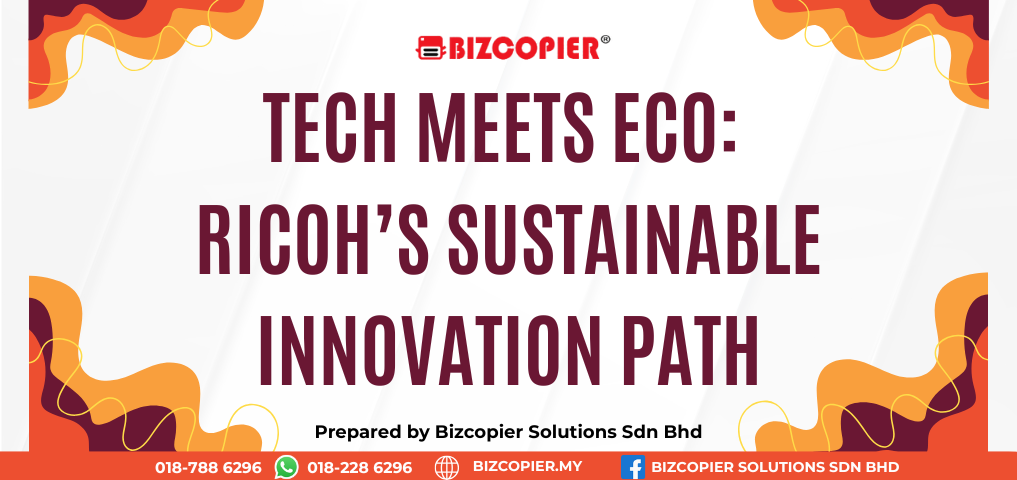Tech Meets Eco: Ricoh’s Sustainable Innovation Path

When people talk about sustainability in tech, the conversation usually starts and ends with energy-efficient data centers or electric vehicles. But there’s a deeper, more integrated story playing out quietly in companies that have been doing the work for decades—Ricoh is one of them.
While most know Ricoh as a legacy imaging and print brand, few realize it’s also been a pioneer in sustainable innovation. Today, Ricoh is proving that environmental responsibility and technological advancement aren’t opposites—they’re two sides of the same strategy.
🌱 A Green Mindset Before It Was Trendy
Sustainability isn’t new for Ricoh. The company has been making green moves since the 1970s—long before ESG became boardroom buzz. It was among the first to introduce:
Copiers made from recycled plastics
Remanufactured MFPs and toner cartridge recycling programs
ISO 14001-certified environmental management systems
This wasn’t greenwashing. It was operational transformation rooted in real accountability.
Ricoh’s early sustainability wins weren’t just good for the planet—they were smart business. Leaner processes, lower waste, and better energy performance directly translated into long-term customer value.
⚙ Sustainability + Technology: A Unified Strategy
What sets Ricoh apart today is how it builds sustainability into its technology stack—not as a side effort, but as a core product feature.
🔋 1. Eco-Conscious Devices
Ricoh’s latest generation of printers and MFPs are:
Energy Star® and EPEAT® certified
Designed with low-power modes and efficient warm-up cycles
Made using recyclable and reduced-impact materials
☁ 2. Cloud & Digital Workflows
Ricoh’s cloud-first services directly support sustainable outcomes:
Reducing reliance on paper and physical infrastructure
Enabling remote collaboration, cutting travel emissions
Offering digital signing, automated approvals, and real-time access
The goal? Reduce carbon footprints by reducing physical workflows.
♻ 3. Circular Economy Leadership
Ricoh actively remanufactures devices under its GreenLine program, extending product life cycles and minimizing landfill impact. Its Comet Circle™ initiative maps the full product life cycle—from resource extraction to recycling—with closed-loop thinking.
📊 4. Data-Driven Sustainability
Ricoh’s sustainability tools give organizations actual metrics, like:
CO₂ saved through digitization
Paper use reduction
Lifecycle emissions of deployed hardware
This transparency empowers customers to track their own ESG progress—not just Ricoh’s.
🌍 Global Goals, Local Action
Ricoh isn’t just pushing green ideals from HQ. It’s integrating sustainability across its global supply chain, manufacturing plants, and regional offices. Notable efforts include:
Sourcing 100% renewable electricity at key facilities
Achieving RE100 and Science-Based Targets initiative (SBTi) alignment
Partnering with NGOs to advance circular economies in underserved regions
The company is actively working toward its goal of net-zero emissions by 2050, with interim checkpoints in 2030 and 2040.
💼 Why This Matters to Businesses Today
Let’s face it: sustainability is now a business requirement, not just a nice-to-have. Ricoh’s offerings help companies:
Meet regulatory compliance (GDPR, ESG disclosure laws, etc.)
Reduce costs via digitization and energy-efficient tech
Strengthen brand reputation with real, verifiable green practices
And in a hybrid work era, Ricoh’s solutions are uniquely positioned to decarbonize distributed workforces through smart print management, cloud collaboration, and remote device servicing.
🧠 Final Thought: Leading Quietly, Acting Boldly
While others announce big sustainability pledges, Ricoh delivers. It doesn’t just “offset” emissions—it rethinks the entire product and service lifecycle with the environment in mind.
It’s not flashy. It’s not performative. But it’s real.
And as sustainability moves from buzzword to baseline, Ricoh is walking the walk—where tech meets eco, and the future of work meets the future of the planet.

Recent Comments